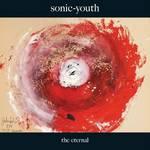
Sonic Youth The Eternal
(Matador)
Sonic Youth's sixteenth studio album The Eternal is a landmark release that sees the band returning to its indie label roots. To celebrate its release, we're posting a handful of reviews from various members of the No Ripcord team.
Chris Conti:
“I think the Matador record shows us in an excited and newly liberated state of play,” Sonic Youth guitarist Thurston Moore told Stereogum.com back in April while discussing The Eternal, their sixteenth full-length album and first for hallowed indie Matador Records. Sixteen albums – and that's excluding coveted gems like the deluxe Daydream Nation reissue, the Confusion is Sex/Kill Yr Idols split LP and Thurston Moore's excellent (and vastly underrated) Trees Outside the Academy to name a few. The band's excited state of mind prevails on recent late-night appearance on David Letterman and Jimmy Fallon.
The Eternal isn't any more or less accessible than Sonic Nurse or Rather Ripped, but equally energetic. The rambunctious spaz-out riffs on concise cuts (7 of the 12 tracks clock in under 4 minutes) Poison Arrow and Lee's What We Know are distinctly spirited. The Eternal is a summertime record, warped and scorched tightly-wound numbers. For as much as Thurston's Trees exuded a late-Fall vibe, The Eternal is summertime bliss – fuzzy, Marshall-humping antics and Steve Shelley's rumbling kit complete with newfound vocal harmonizing. Try Antenna at the 4th of July bonfire, stoned out of your face while the opening guitar squall whistles to the moon and back. It's a subtly cool killer like New Hampshire or Stones from 2004's Sonic Nurse.
Back-to-back standouts Calming the Snake and Poison Arrow both conclude with a half-minute of Shelley's hellbent, almost tribal drumming. On What We Know, he and Ibold lock onto the swarm of guitars and don't relent, as Lee closes out the final verse atop jaw-clenched guitars, “Yeah, that we know--bound to give it heart and soul/ That's what we know-- about us.” Beat poets and ill-fated punk rockers are saluted in Leaky Lifeboat (for Gregory Corso) and Thunderclap for Bobby Pyn (aka Darby Crash, co-founder of The Germs); the press sheet for Malibu Gas Station reads: “an ode to the flash moment of the camera as you knowingly step from your SUV sans panties,” so it's no surprise Gordon takes the reigns here, but she is equally captivating in hushed, hypnotized tones on the final track Massage the History. Acoustic guitars swirl about and Gordon latches on through the three-minute tornado midway through.
Producer John Agnello worked the boards on Rather Ripped and returns for The Eternal, and offered his thoughts via email while we were drilling him with questions on the new Dinosaur Jr album.
“It's interesting with the Youth. They all have so many things going on and yet when it's time to make a record, they get it done. And not as an afterthought. It's their focus.
“In terms of the Sonics new record, The Eternal will prove to be more muscular and more poppy on certain levels than Rather Ripped. It's certainly heavier, but it's tuneful and heavy at the same time. And believe you me, I love Rather Ripped. It's an awesome record with some real classic SY songs. But I think The Eternal will blow peoples minds. I mean, my three year old is obsessed with the record to the point of wanting to hear it all the time.” (9)
. . .
Ryan Faughnder:
Of the legions of alternative and indie-rock outfits that claim Sonic Youth as an influence (the two genres seem to fight over the band like jealous children competing for their parents’ attention), few actually embody the legendary group’s spirit. Bands such as No Age, Wavves, and even Sunn O))) use noise textures that claim SY lineage, but they use those dissonant sounds in such a way that often soothes the listener. Such a claim about Sonic Youth’s freak-outs is hard to justify. Furthermore, whereas indie-rock’s moods usually range from the ironically nonchalant to the clinically depressed, Kim Gordon, Lee Ranaldo, Thurston Moore, and their band mates tend to make angry music with outbursts of chaos that reset the listener’s stalled consciousness. At least with their strongest material, if you’re comfortable while listening to a Sonic Youth song, you’re probably not paying attention.
That’s the one thing missing from The Eternal, as with most of their post-2000 output. Rather than shock fans with intentionally offensive switch-ups like the one halfway through Mildred Pierce from the album Goo, they now let their song-writing provide most of the momentum, which is not a bad thing. The punk-styled Sacred Trickster features some of Gordon’s best lines, particularly when she takes deservedly biting shots at the inane questions of rock journalists (“What’s it like to be a girl in a band? I don’t quite understand. That’s so quaint to hear. I feel so faint, my dear.”).
SY makes little progress on The Eternal, but the music here, as with 2006’s Rather Ripped, illustrates the difference between a band comfortably doing what it’s best at and a band doing what it’s the best at. Unlike, say, U2, the band members feel no need to alter their direction in order to challenge expectations, probably because they know that what’s normal for them still provides plenty of surprises for the rest of us, such as the natural harmonics on Leaky Lifeboat that sound like tones from an amplified xylophone. They’ve already changed the indie music world; now, for a while at least, they get to rule that world. (8)
26 June, 2009 - 12:06 — No Ripcord Staff